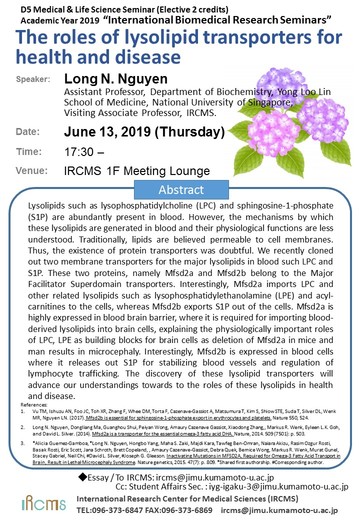- HOME
- News & Events
- [June 13]D5 Medical & Life Science Seminar - Dr. Long N. Nguyen
News & Events
[June 13]D5 Medical & Life Science Seminar - Dr. Long N. Nguyen
May 20 2019
The "D5 Medical & Life Science Seminar" course will be offered by International Research Center for Medical Sciences (IRCMS). It will run from April 2019 to March 2020, with lectures given by scientists who are affiliated with IRCMS or in collaboration with researchers at IRCMS. The lectures will be given once a month, in English, and by leading scientists in the relevant research field. Students will be taught: 1) how normal physiological functions are maintained in the human body; 2) how abnormalities in these systems (e.g., cancer) are studied using experimental models; 3) cutting-edge technologies (including single cell level imaging and omics analysis) used for mechanistic understanding of these abnormalities; 4) efforts and progresses in finding cure for human diseases associated with these abnormalities; and 5) importance of understanding disease mechanisms using cross-disciplinary approaches.
Date : June 13, 2019 (Thursday)
Time : 17:30 -
Venue : IRCMS 1F Meeting Lounge
Speaker : Long N. Nguyen
Assistant Professor,
Department of Biochemistry, Yong Loo Lin School of Medicine, National University of Singapore,
Visiting Associate Professor, IRCMS.
Title : The roles of lysolipid transporters for health and disease.
Abstract :
Lysolipids such as lysophosphatidylcholine (LPC) and sphingosine-1-phosphate (S1P) are abundantly present in blood. However, the mechanisms by which these lysolipids are generated in blood and their physiological functions are less understood. Traditionally, lipids are believed permeable to cell membranes. Thus, the existence of protein transporters was doubtful. We recently cloned out two membrane transporters for the major lysolipids in blood such LPC and S1P. These two proteins, namely Mfsd2a and Mfsd2b belong to the Major Facilitator Superdomain transporters. Interestingly, Mfsd2a imports LPC and other related lysolipids such as lysophosphatidylethanolamine (LPE) and acyl-carnitines to the cells, whereas Mfsd2b exports S1P out of the cells. Mfsd2a is highly expressed in blood brain barrier, where it is required for importing blood-derived lysolipids into brain cells, explaining the physiologically important roles of LPC, LPE as building blocks for brain cells as deletion of Mfsd2a in mice and man results in microcephaly. Interestingly, Mfsd2b is expressed in blood cells where it releases out S1P for stabilizing blood vessels and regulation of lymphocyte trafficking. The discovery of these lysolipid transporters will advance our understandings towards to the roles of these lysolipids in health and disease.
References:
- Vu TM, Ishuzu AN, Foo JC, Toh XR, Zhang F, Whee DM, Torta F, Cazenave-Gassiot A, Matsumura T, Kim S, Shiow STE, Suda T, Silver DL, Wenk MR, Nguyen LN. (2017). Mfsd2b is essential for sphingosine-1-phosphate export in erythrocytes and platelets. Nature 550, 524.
- Long N. Nguyen, Dongliang Ma, Guanghou Shui, Peiyan Wong, Amaury Cazenave Gassiot, Xiaodong Zhang,, Markus R. Wenk, Eyleen L.K. Goh, and David L. Silver. (2014). Mfsd2a is a transporter for the essential omega-3 fatty acid DHA. Nature, 2014. 509 (7501): p. 503.
- *Alicia Guemez-Gamboa, *Long N. Nguyen, Hongbo Yang, Maha S. Zaki, Majdi Kara, Tawfeg Ben-Omran, Naiara Akizu, Rasim Ozgur Rosti, Basak Rosti, Eric Scott, Jana Schroth, Brett Copeland, , Amaury Cazenave-Gassiot, Debra Quek, Bernice Wong, Markus R. Wenk, Murat Gunel, Stacey Gabriel, Neil Chi, #David L. Silver, #Joseph G. Gleeson. Inactivating Mutations in MFSD2A, Required for Omega-3 Fatty Acid Transport in Brain, Result in Lethal Microcephaly Syndrome. Nature genetics, 2015. 47(7): p. 809. *Shared first authorship. #Corresponding author.

